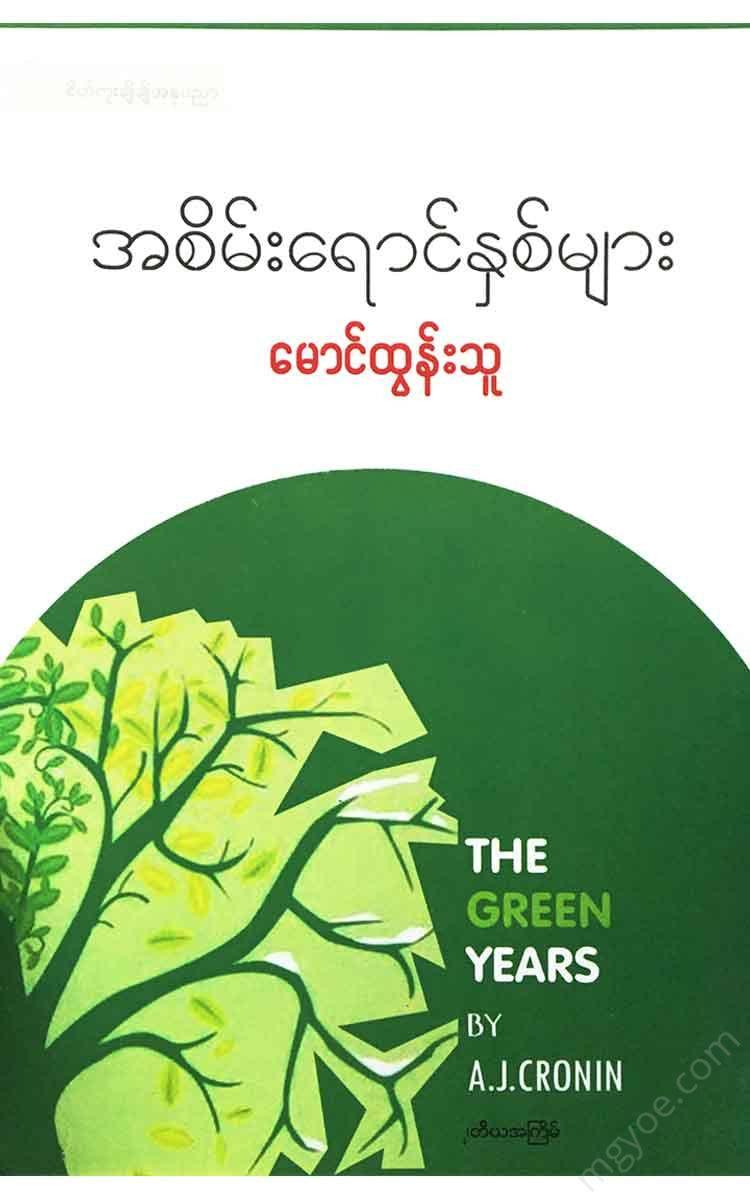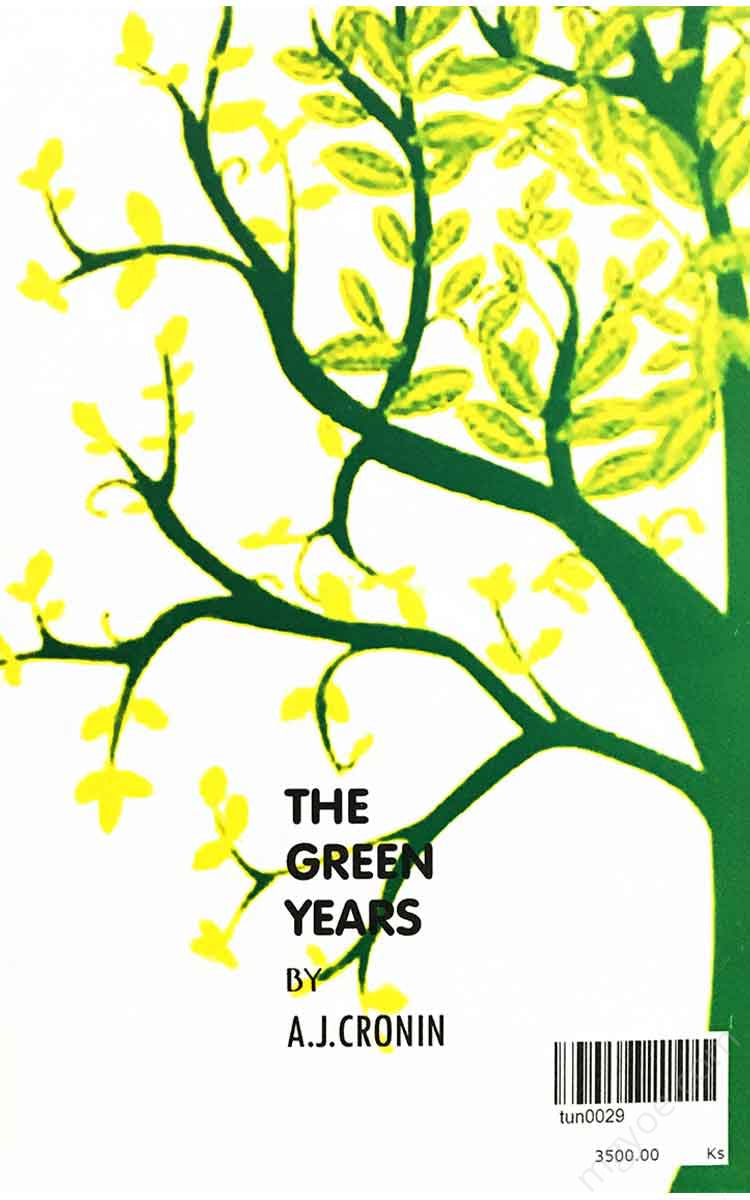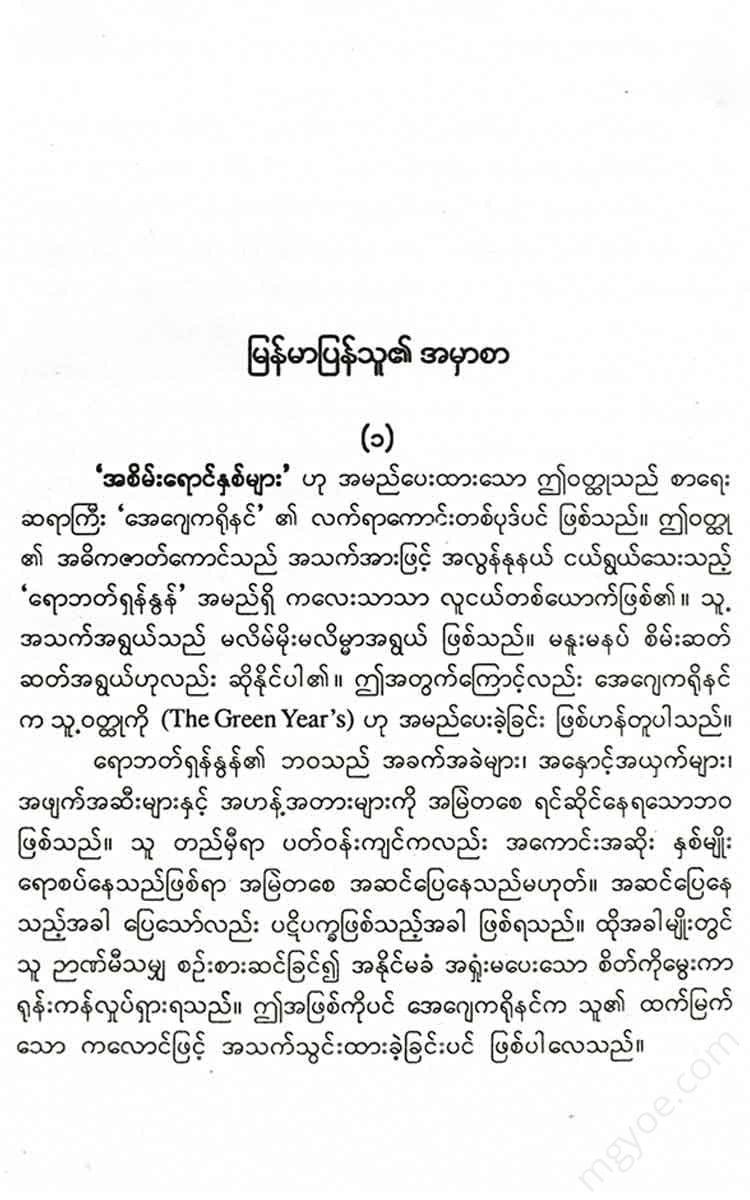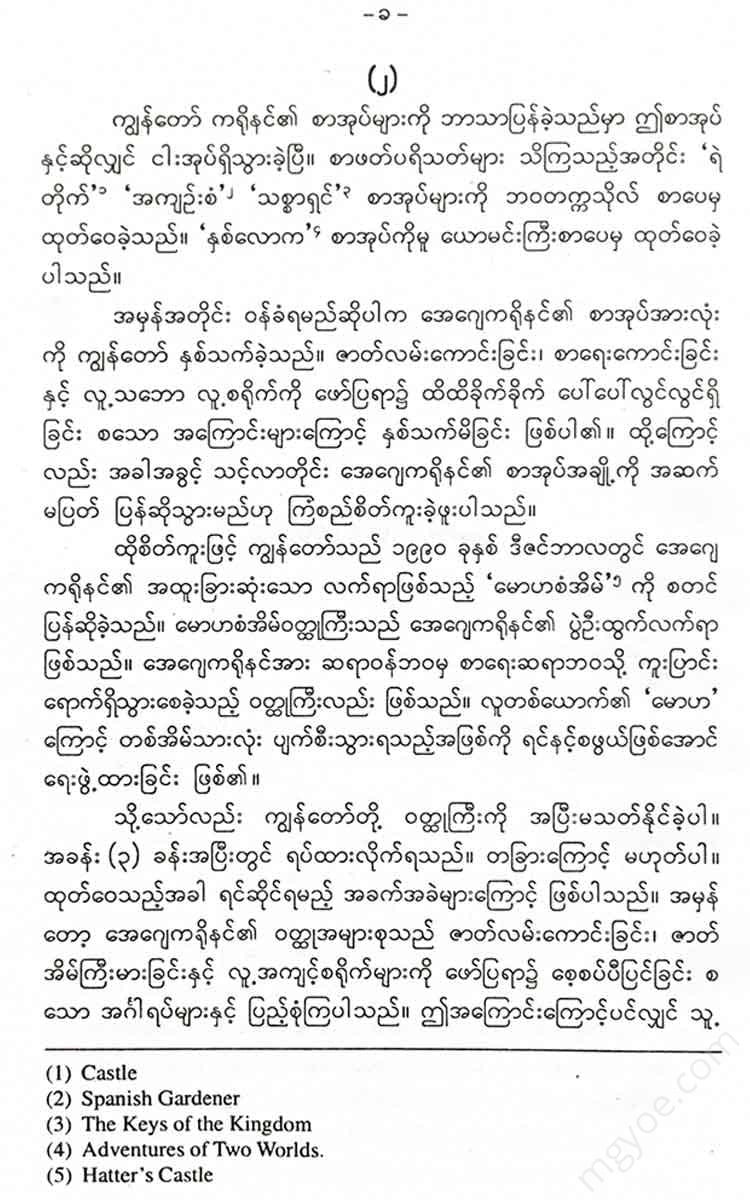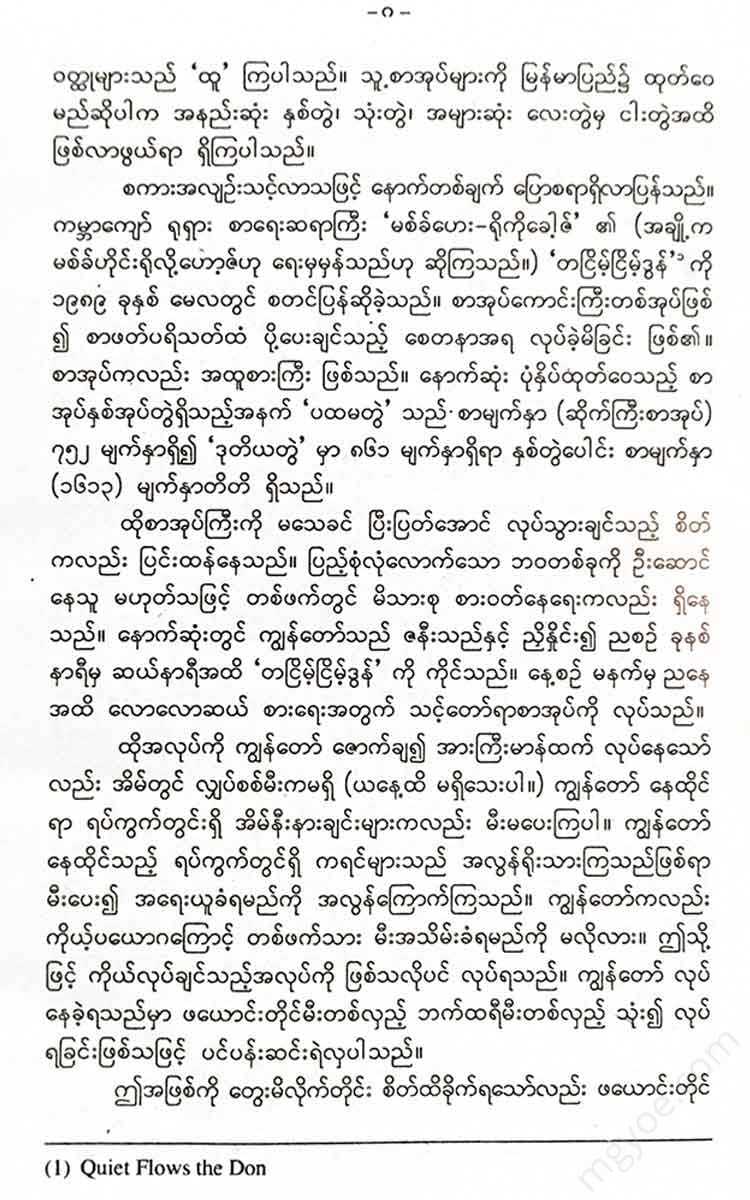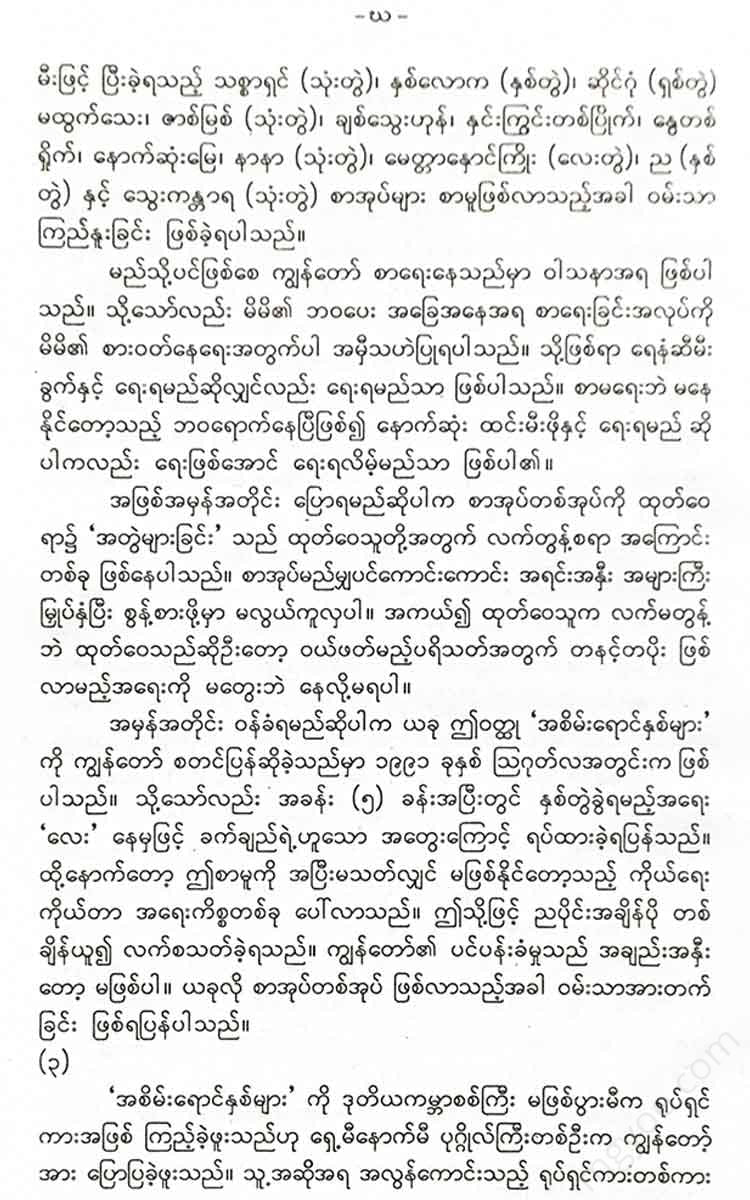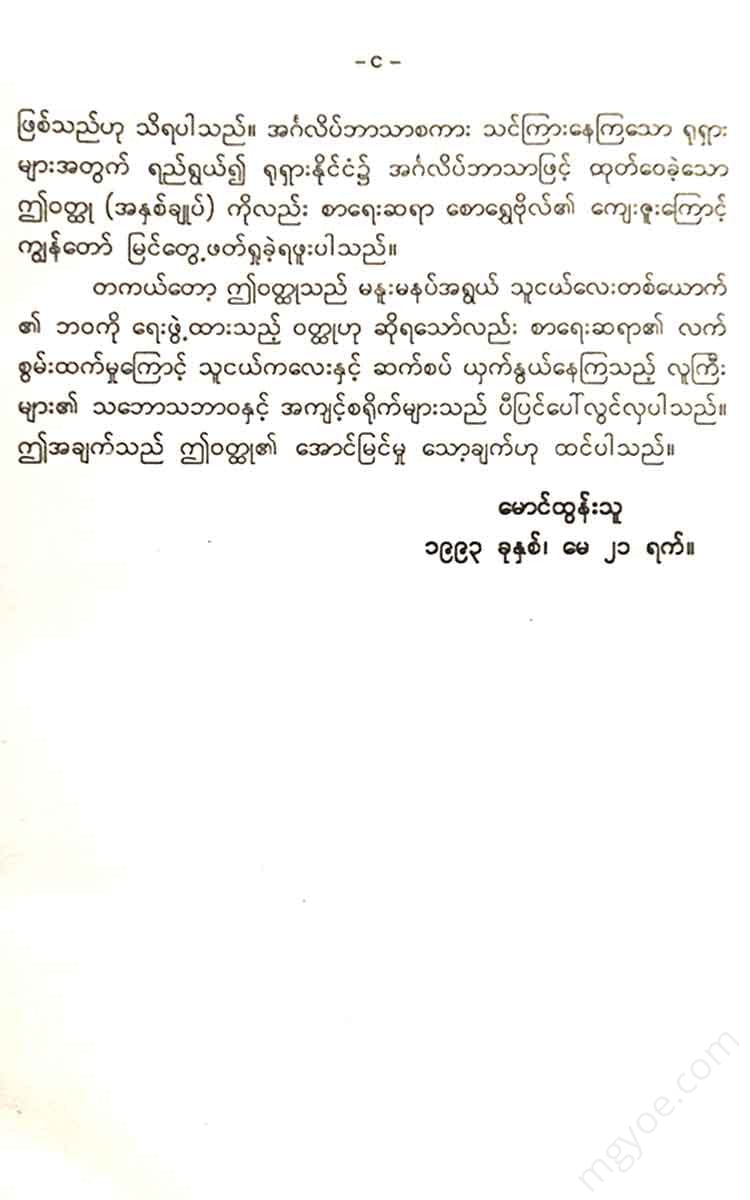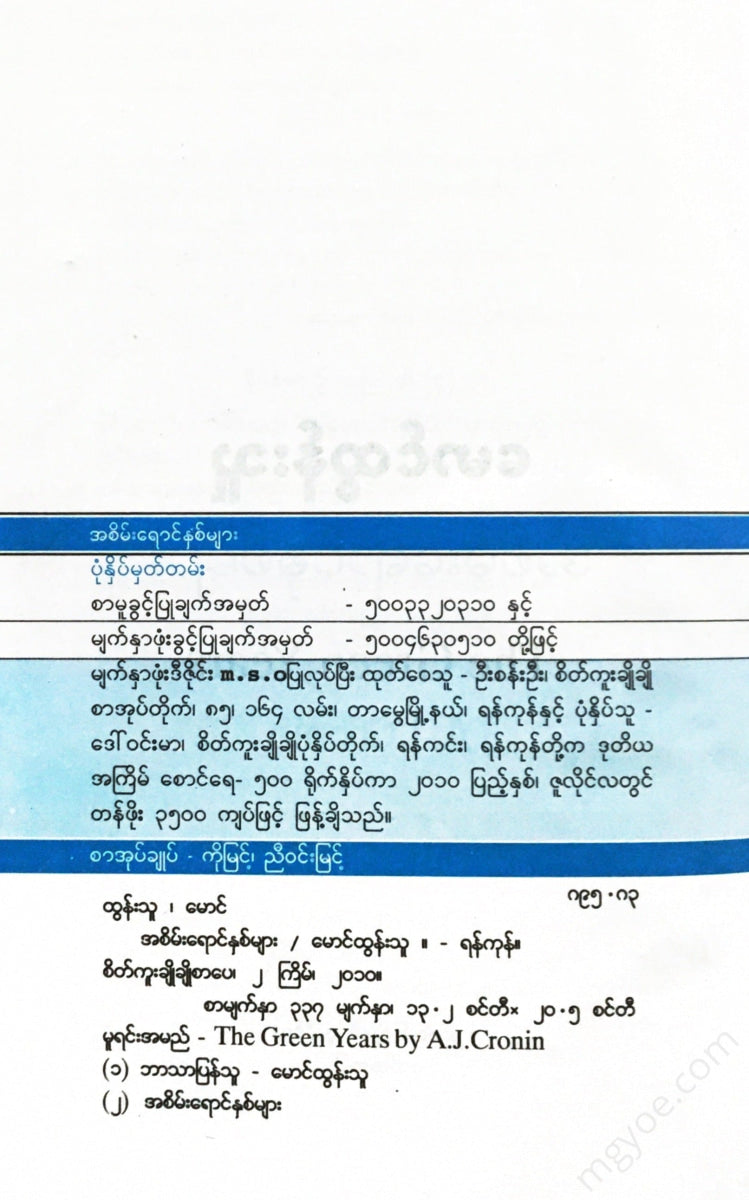စိတ်ကူးချိုချိုစာပေ
Maung Tun Thu - Green Years
Maung Tun Thu - Green Years
Couldn't load pickup availability
Chapter (1)
Holding Mama's hand tightly, I emerged from the dark, gloomy canopy of the train station and entered the bright streets of the city.
In fact, from now on, I will only trust Mama. I will have to rely on her. However, my heart is still aching because of Mama's face, which is a kind of expression. Mama's face is pale and sad. Mama's blue eyes are colorless and express sadness. I have never seen Mama's face so pale and sad before, and I am surprised.
Mama put money into the automatic machine and took the chocolate wrapper that came out and put it in my hand. Even though she did this much, my heart was still aching. I had no desire to trust Mama.
All the way from Winton, Mama and I sat facing each other in the third-class carriage. Mama, dressed in shabby clothes, looked out the window. She leaned her head against the wall. Her lips moved. She talked to herself. Every now and then she took out her handkerchief and wiped the corners of her eyes.
When we got off the train, Mama seemed to have regained her composure. She smiled at me and held my hand tightly.
"Don't cry anymore, son. You can walk home, right? It's not far, my child."
"I can walk," he replied. We didn't take the only taxi outside the station, but walked along the high street.
As I walked along the platform, I could still hear the sound of the waves crashing in the Irish Channel. On one side of the road I could see a large building, built of large, polished stone pillars. In front of it were two ancient cannons and a flagpole. I could hear Mama talking.
"This building is the municipal office of Kevin, Robert. Mr. Lackey works in this office. He is in charge of the health department."
“Who did you say ‘pa’ to?” I wondered, confused. “Did you say ‘pa’ to my husband, or to my father?”
My feet were making a loud clatter as they walked across the stone-paved platform. Mama looked down at me with a worried expression on her face.
"It's too bad the trams aren't running today," he said.
I was not only more tired than I had expected, but also more frightened. It was a dull September afternoon. The streets were cobblestone, and the sound of footsteps was loud and clear. The sounds were making me even more afraid. The sounds I was hearing now were not like the sounds of cars coming through the windows of my house in the Phoenix neighborhood where I lived. They were not the kind of sounds I was used to hearing, and my mind was in a different place.
The sound of hammers from the shipyard was continuous. Flames and smoke from the boiler plant, which Mama pointed out, rose into the sky. Sometimes the wind would blow hard. Then dust would get into my eyes. My throat would become sore.
Soon the noise from the docks faded away behind us. We passed through a park with a small pond and a bandstand. Then we entered a suburb of the city. The neighborhood was located at the foot of a hill covered with forest. It looked like a small village.
Around here are trees and green fields. There are small old-fashioned shops and cottages. There are large houses with signs on the front doors saying “Helenfield, Glenelg.” These houses have a stately appearance with iron fences, gardens, and a stately appearance.
We walked down the narrow street and finally stopped in front of a tall building with a sign that read “Lo Mon Kyu Geha.” I saw that the front windows were covered in yellow shutters.
The appearance of this house on a quiet street is not at all imposing. The facade of the house is finished, but the rest of the parts are rough. The chrysanthemums swaying in the breeze from the flower garden in front of the house add to the charm of the house.
“I’m home, Robert,” said Mama. “The weather is still nice, so it’s not too bad. But there are beautiful villages around.”
This was a very strange environment for me. My chest was pounding with anxiety. But I braced myself and followed Mama. As I followed, I remembered our neighbor, Mrs. Chapman, who had kissed me goodbye at the Winton docks this morning before leaving Dublin. And then something she said.
"What else will happen to you?"
My ears were echoing his words. I noticed that his voice was filled with hurt.
At the back door, Mama paused for a moment. She saw a man busy with a shovel, replanting a flower bed. The young man, about nineteen years old, was digging in the dirt on his knees. When he saw us, his appearance was one of languor and slowness. His hair was dark, his skin was pale, and he wore thick glasses, a sign of poor eyesight.
"Are you doing this again, Mado?"
In the morning, he took my hand and pushed me towards the young man.
"It's Robert," Maddox looked me up and down.
"Well... he finally got here," he muttered.
Mama nodded. A hint of sadness flashed in her eyes. Mado stepped forward and shook my hand. The dirt from her hand touched mine.
"Nice to meet you, Robert. Let me know if you have any problems," he said, turning to Mama.
"We'll plant free plants from the nursery. It won't cost a penny, Mama."
"Okay, whatever. But you should take a shower before Papa comes back. He'll be angry if he sees you working like this when he gets back," Mama said.
“I’ll be there. I’ll be back in a moment.” Madou knelt down and continued his work. He called out to his mother, who had taken my hand and was leaving. “I’ll boil the potatoes, Mama.”
We passed through the pantry into the kitchen. From there we entered the living room, which was furnished with mahogany chairs and tables. Mama took off her hat, tied it around her neck, and motioned for me to sit down. I smiled, trying to cheer her up.
"Mama and I had dinner early in the evening. When Papa comes back, don't cry or act like a fool. He'll be sad. He has a lot to worry about for the whole town, so Mama and I won't make him unhappy."
"Mama's daughter Kate will be here soon. She's a schoolteacher, your mother told you. It's going to be a bit of a shock to meet your mother's relatives for the first time."
“Mama’s oldest son is Adam. He works in the insurance business in Winton. He doesn’t live with Mama and me. But he comes here when he wants. And then there’s Papa’s mother. She’s visiting her friends at the moment. She’s with Mama and me a lot. The other one is Mama’s father. He’s always here. He’s a great friend to you. Not all children are perfect. He’s a great friend.
"I'm so proud of you. You just call him 'Grandpa', okay? Mama will prepare a plate of dinner for you, and you can go and deliver it to him yourself. He's upstairs. When you get to him, ask him if he's okay."
Mama was preparing dinner for five people. She had neatly arranged the dinner plates on an old-fashioned platter. Not only the dishes, but also a pot of tea, a bowl of milk, and three slices of bread.
“Doesn’t Grandpa eat dinner downstairs?” I asked. Mama seemed a little confused. “No, he doesn’t. He eats in his room,” she replied. She handed me the plate and said, “Can you take it? Grandpa lives upstairs. Hold it tightly and don’t let it fall.”
I held the tray tightly and climbed the stairs, which I was not used to. The stairs were covered with wax, so I was very careful not to slip on them. When I reached the second floor, I went to one of the two doors and opened it. It was locked, but I couldn't open it. The second door opened easily.
I entered the room. It was a very untidy room. In one corner stood a brass bed. The sheets and blankets on the bed were disheveled, the bear rug in front of the fireplace was torn and crumpled. The towels were hanging on a row, and no matter where I looked, I could see a chaotic situation. My nose was filled with the smell of cigars and leftovers.
My grandfather sat in a rocking chair by the rusting stove, a low table in front of him, papers piled on it, and a pen scribbling away. At one side of him lay a prodigious number of walking sticks. On the other side was a box filled with old newspapers and a shelf lined with a large number of clay sticks... The sticks were filled with medicine. They were designed to be easy to pull out and drink.
Grandpa was a strong, stocky man. He was taller than most people. He was probably about seventy years old. His skin was pink, his hair was red, but in some places it was streaked with gold. There was no trace of white. His beard and mustache were also golden. Although his eyes were white, they had a hint of yellow, but the blue in the pupils of his blue eyes was not as pale as Mama's, but bright.
The most striking feature of my grandfather's face was his nose. It was an extremely large nose, red and bulging. I stared at his large nose in amazement. I thought it dominated his face. I had never seen such a large and strange nose.
Grandpa stopped writing and put the pen to one of his ears. Then he turned his face to me and looked at me. The splines on the chair were falling apart, so he had to put thick brown paper in them, twist them, and fix them. However, the chair, which could not bear the weight of Grandpa, creaked and creaked with every movement.
We stared at each other. I had forgotten about the big nose that had intrigued me earlier. Standing before him in a cheap black dress, I was aware of my own flaws. One of my socks was slipping down. My shoelaces were untied. My face, which had been stained with tears, was pale. My hair was red. I felt a sense of inferiority, a sense of inferiority.
Grandpa pushed his paper aside and pointed to an empty space on the table. I placed the plate in his hand where he indicated. His gaze shifted away from me. He immediately took the food from the plate in front of him and ate it. He chewed everything he put in his mouth quickly and swallowed it quickly. He also made tea and sipped it with great gusto. Then he carefully wiped away any dirt that had settled on his beard with his hand. Then he took a cigarette from the shelf and lit it.
"Is that you Robert Shannon?"
Grandpa's voice was firm, yet friendly.
"Yes, of course, Grandpa"
My voice was soft. I remembered that my mother taught me to call him "Grandpa" instead of "Grandpa."
"Did you have fun on the road?" "Yes... Grandpa."
"Oh... that's good, the "Edgar" and the "Fire" are good ships. I used to go up to the bedrooms of those ships when I was working in the excise department. The Edgar is better. So I have to ask you. Do you play tiger?"
"I can't play, Grandpa."
He nodded. “If you stay here, you’ll learn in time,” he said. “As far as I know, you’ll be staying here, right?”
"Yes, Grandpa, Mrs. Chapman said there was nowhere else to go in the world but here."
I felt sorry for myself, thinking about my life as an outcast.
Suddenly I felt a strong desire to gain his sympathy. I also felt a strong desire to tell him the whole story of my miserable life. He knew that my father had died of pneumonia. It was a disease that had always haunted my father's family like a ghost. His two older sisters had also died of the same disease. Finally, the disease infected my mother and she died. I was constantly worried that the disease would harm me too.
